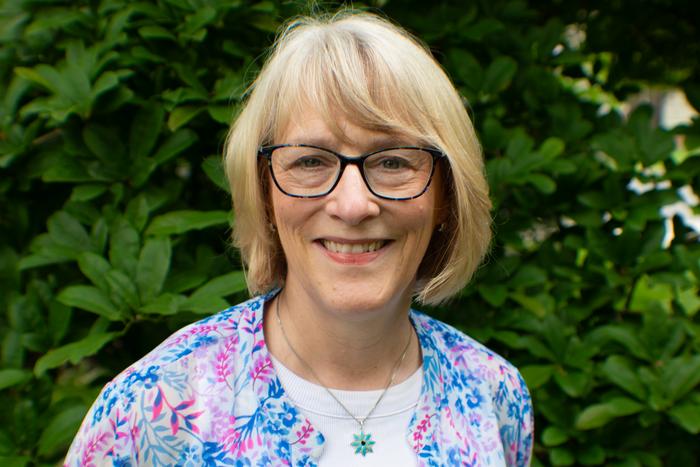University of Massachusetts Amherst food scientist Lynne McLandsborough has won the 2024 Mahoney Life Sciences Prize for her research that offers a solution to a sticky sanitation and food safety dilemma hounding the peanut butter and chocolate industries.

Credit: UMass Amherst
University of Massachusetts Amherst food scientist Lynne McLandsborough has won the 2024 Mahoney Life Sciences Prize for her research that offers a solution to a sticky sanitation and food safety dilemma hounding the peanut butter and chocolate industries.
“I was really surprised and excited,” McLandsborough says of winning the prize. “I think our research is innovative and there’s a need in the industry. It was a fun project.”
She is already in talks with Mars, the world’s largest chocolate manufacturer, and J.M. Smucker, the owner of Jif peanut butter, to test her novel “dry” sanitation method in peanut butter and chocolate pilot plant facilities, and she has filed a patent application on the innovation.
You don’t have to be a commercial candy bar producer to know how tough it is to clean low-moisture foods like peanut butter and liquid chocolate off utensils, bowls and kitchen equipment. The sticky mess happens because of the high-fat content of those foods and the chemical reality that water and oil don’t mix.
“Outbreaks of salmonellosis associated with low-moisture foods are a persistent problem,” says McLandsborough, who, in addition to her role as professor, also serves as the interim associate vice chancellor for research and engagement and interim director of the Center for Agriculture, Food and the Environment (CAFE).
Her lab’s discovery holds promise to make sanitizing facilities processing low-moisture foods more efficient while improving food safety and reducing bacterial illness outbreaks.
Richard Mahoney, former CEO and chairman of Monsanto, expressed his enthusiasm for the Mahoney Life Sciences Prize and McLandsborough’s breakthrough. “We are thrilled to champion the innovative research led by UMass researchers. It is crucial to bridge scientific discoveries with industrial applications to address pressing challenges and improve lives.
“Dr. McLandsborough’s research exemplifies this mission and has the potential to revolutionize food safety nationally and globally. The extraordinary advancements at UMass Amherst continually position the university as a premier research institution on the world stage,” says Mahoney, who along with his brothers, Robert and William, established the Mahoney Prize in 2018.
The Mahoney brothers received their chemistry degrees from UMass Amherst and went on to become leaders in their own industries. They have served as high-level alumni advisers to UMass Amherst and as mentors to students.
The annual competition seeks scientists in the College of Natural Sciences (CNS) who are engaged in high-impact life sciences research that addresses a significant challenge and advances collaboration between researchers and industry. Following a review by an expert panel of life-science-industry scientists and executives, the $25,000 prize is awarded to one CNS faculty member who is the principal author of peer-reviewed research that meets the goals of the Mahoney Life Sciences Prize.
McLandsborough’s winning research paper was published in April 2023 in the journal Microbiology Spectrum. Facilities processing low-moisture foods “dry” clean the equipment followed by hot oil flushing, which removes residues in processing lines but doesn’t kill bacteria like Salmonella. That bacteria exhibits higher heat resistance in high-fat and low-water environments.
“Low moisture sanitization products are formulated with flammable solvents (rather than water), requiring manufacturers to dry, clean and cool equipment before application, resulting in days of downtime,” McLandsborough says. “Therefore, routine cleaning and sanitization occur less frequently in low-moisture food processing facilities.”
McLandsborough and her team initially developed a formulation of oil and acid to create an effective antimicrobial sanitizer that resulted in a bacteria kill rate of more than four log, or 99.99%. But the standard kill rate for a sanitizing agent needs to be five log, or a kill rate of 99.999%.
Then came the “aha” moment—when the researchers discovered the missing ingredient needed in the formulation to kill more than 99.999% of Salmonella bacteria: a few drops of water.
“We added a small, controlled amount of water as an emulsion,” McLandsborough explains. “We mixed the acidified oil with a surfactant and water. Just a small amount of water —1 to 3%—enhanced our kill, and now we’re getting a six-log bacterial reduction (or 99.9999%. kill).”
Chalk up the improved kill rate to osmotic pressure, which accelerated the antimicrobial action of the water-in-oil emulsion. “The cool thing is that osmotic pressure is one of the first concepts you learn when you take basic microbiology, and it’s also one of the basic things you learn in food science,” McLandsborough says. “It’s simple, but it works.”
Monica Tan, senior vice president of Product & Engineering at Science Exchange and a member of the panel of external experts who reviewed the Mahoney nominations, selected McLandsborough’s research for the prize.
“Dr. Lynne McLandsborough begins her research essay with a beautifully crafted opening paragraph that clearly presents the problem statement. She concisely outlines her approach, making it easy to understand,” Tan says. “Her research appears solid, but what truly stands out is the industry acceptance she has already received from major food companies like M&M Mars and Barry Callebaut. Her submission this year is notable for being the most advanced in bringing academic research to market.”
In addition to Tan, the other reviewers who ranked McLandsborough’s research as their top choice for the prize included: Stefan Baier, chief science officer for Aqua Cultured Foods; Leslie Dierauf, retired wildlife veterinarian and conservation biologist; David Mazzo, president and chief executive officer of Lisata Therapeutics, Inc.; and Diane Stengle, retired associate professor of STEM at Holyoke Community College.



